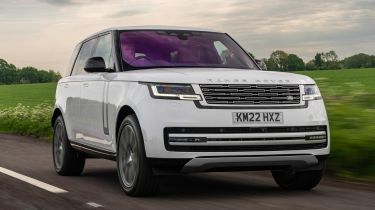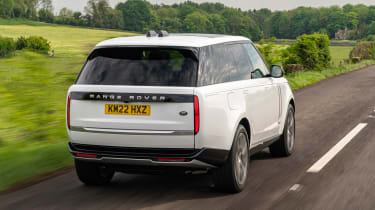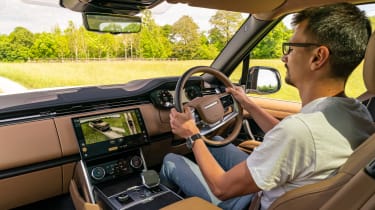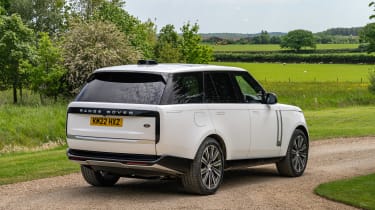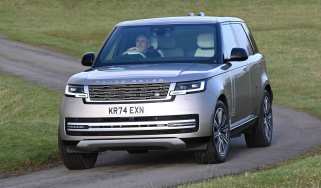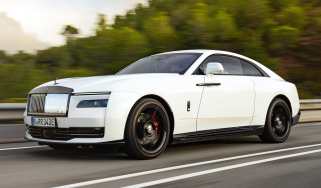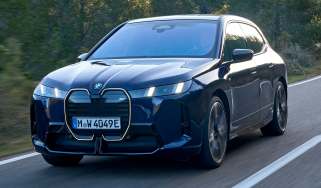New Range Rover D350 Autobiography 2022 review
We drive a new Range Rover mild-hybrid diesel model in the UK to see if the iconic luxury 4x4 is still just as impressive as ever

Verdict
A UK drive in the high-spec Autobiography trim reveals a few chinks in the 2022 Range Rover’s armour, but it remains an incredibly convincing luxury car overall, with a vast breadth of abilities.
The original Range Rover kick-started a whole new genre of vehicles when it was launched over 50 years ago. The automotive world has changed considerably since then, of course, and the SUV segment is now a dominant force. As such, the originator has to cut it in a more crowded marketplace than ever.
An all-new version is just what Land Rover needs to stay relevant. Except, for the freshness underneath, including the new ‘MLA-Flex’ architecture, this D350 in the kitted-out Autobiography trim (one step down from the top-of-the-range SV) doesn’t look all that different from the front. Look for the changes, however, and they’re there, including new LED light clusters and a different-shaped (but still modestly-sized by modern standards) grille.
At the back, the deviations are more obvious, the most radical part of the design being what seems to be a complete lack of rear lights. They’re hidden within the black panelling until turned on - a neat touch. From the sides, meanwhile, it’s a remarkably clean, unfussy design, setting itself apart from visually busy cars like the BMW X7.
Used - available now

2021 Land Rover
Range Rover
59,148 milesAutomaticDiesel3.0L
Cash £48,991
2021 Land Rover
Range Rover
46,898 milesAutomaticPetrol3.0L
Cash £49,995
2020 Land Rover
Range Rover
78,823 milesAutomaticDiesel4.4L
Cash £33,882
2020 Land Rover
Range Rover
20,558 milesAutomaticPetrol5.0L
Cash £51,750Inside, again, it’s going to feel fairly familiar to anyone who’s been in the outgoing car. This time, though, there’s a noticeable improvement in quality and premium feel. The 13.1-inch ‘Pivi Pro’ navigation system is new, and it’s in a tablet style, but curiously, it still sits fairly low, where it might do if it was still integrated into the dash.
It’s a shame Land Rover hasn’t made the most of the floating arrangement and moved it closer to eye level, but it’s a slick system overall. We prefer having some sort of tactile control for it like BMW’s iDrive rotary dial, but the touchscreen is responsive, and the menu system is clear and easy to navigate. The graphics are really crisp, but we’re not fans of the surprisingly aggressive haptic feedback.
Thankfully, it’s not difficult to turn this off. Another tech item you might want to disable is the ‘ClearSight’ rear-view mirror display, which takes a feed from the rear parking camera. It may provide a wider field of view than a conventional rear-view mirror since you aren’t having to peer through a pair of C-pillars, but it can be distracting, and the display often looks washed out.
As on the mid-range HSE, the ClearSight comes as standard here, along with other spec highlights including a sliding panoramic sunroof, 24-way heated and cooled massage front seats plus 'Executive Class' seating in the rear, ‘SV bespoke’ wooden veneers and a Meridian Signature Sound System.
Although the screen is probably big enough to accommodate digital climate controls, Land Rover has - thankfully - resisted the urge and left a set of buttons and a pair of dials below. As seen in other products from the company, the latter controls the temperature by default but can operate the fan speed if pulled towards you, or the heated seats if pushed.
On the move, the Range Rover quickly impresses with its smooth, cosseting ride and almost deathly quiet running, but there are limits to the car’s talents in these areas. While great at ironing out most imperfections in the road surface, the Range Rover is curiously vulnerable to high-frequency chatter, particularly at high speeds, transferring the chop into the cabin much more readily when we’d like.
At lower speeds, meanwhile, larger hits can sometimes transmit a dull but surprisingly loud thud of wheel and tyre noise, even if the suspension does a good job of absorbing the bump itself.
In terms of ride comfort, then, it’s mostly good news. There’s a clear focus on comfort, but it doesn’t come at the expense of how the Range Rover behaves when it reaches a corner. There’s a highly satisfying moment when you reach a bend at a decent pace, expect a hefty dose of body roll, and then react in bemusement at its relative absence.
There are SUVs that corner flatter, of course, but those have a more sporting nature that comprises general comfort. In the Range Rover, the ride and handling are deftly balanced, making it more fun than you might expect to tackle a good B-road. The steering meanwhile isn’t exactly brimming with feedback, but it’s well-weighted, and although not the fastest rack out there, this suits the nature of the car.
Helping the Range Rover feel especially agile is a rear-wheel steering system, which angles the rear wheels in the opposite direction to the fronts at lower speeds. This also gives the car a super-low turning circle under 11 metres, helping not just low-speed manoeuvring, but during off-roading too. We’ll get to the latter soon.
One less successful part of the driving experience is the eight-speed automatic gearbox. Most of the time, it fades into the background, as all good autos should, but there are occasions when it makes itself known for the wrong reasons.
For instance, the shifts, particularly under high load, can sometimes be quite harsh. It can also be sluggish to kick down at times, even in Dynamic mode. The metal steering-wheel-mounted gear shift paddles are, at least, quality items, in stark contrast to the plasticy items used by many rivals.
In our test car, said gearbox is hooked up to a D350 3.0-litre mild-hybrid Ingenium inline-six diesel, which puts out 345bhp and 700Nm of torque, making for a 6.1-second 0-62mph time. It's a good figure for such a heavy car, and it translates in the real world to all the straight-line performance you could ever need.
With a wealth of mid-range punch, you have to question the need for the BMW-sourced 4.4-litre twin-turbo V8 coming later, particularly given the way fuel prices are going and that car’s enormous up-front cost. For a diesel, the D350 unit is also smooth and refined.
A Range Rover has to perform off-road too, and on a detour via Land Rover’s Eastnor Castle Experience centre, the car proves this with ease. Tackling rough ground is disarmingly easy even on road-biased all-season tyres, not just because of the capable suspension and locking differentials, but also the array of cameras.
Granted, the festooning of lenses in the front grille might not look the neatest, but the various angles on offer give a huge confidence boost when navigating an off-road course in such an expensive SUV.
Of particular use are the two cameras showing a view of the front wheels - great for showing where the corners of the car are in relation to anything you’d rather not hit. The all-wheel steering also helps when negotiating tight, muddy switch-backs.
The final string to the Range Rover’s bow is practicality. For the first time ever, you can have it as a seven-seater, and with a decently-sized third-row. As before, you get the famed split tailgate to sit on whenever you need to take a break on your luxury off-road excursion, while in the front, there’s an abundance of large cubby holes, including one neatly ‘hidden’ below the cupholders.
The Range Rover still has some areas for improvement, and inside, it perhaps ought to feel a touch more special considering the cost - the average price of the 2022 Range Rovers so far in the UK is around £125,000, just above the price of ‘our’ D350 Autobiography, which starts at £122,375. The V8 mentioned earlier is £157,820, and more people than you might think are spending over £200k on these cars once options and personalisation are taken into account.
Even so, the Range Rover blends luxury, comfort and driver engagement better than anything else out there for the money. A Bentley Bentayga betrays its Audi Q7 links if you look too closely, and we’ve already discussed the looks of the BMW X7, which also isn’t as nice as the Range Rover on the inside.
You probably don’t need to spend quite as much as this, though. Impressively specced the Autobiography might be, a £108,775 D350 HSE or the £105,675 D300 in the same trim will tick all boxes for most, and then some.
| Model: | Range Rover D350 Autobiography (SWB) |
| Price: | £122,375 |
| Engine: | 3.0-litre 6cyl mild-hybrid turbo diesel |
| Power/torque: | 345bhp/700Nm |
| Transmission: | Eight-speed automatic, four-wheel drive |
| 0-62mph: | 6.1sec |
| Top speed: | 145mph |
| Economy: | 35.6mpg |
| CO2: | 208g/km |
| On sale: | Now |

